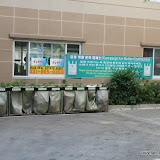We have learned a great deal while living in South Korea on the customs and culture. Most of the things we have learned continually have us posing the question “why do we not do that in the US?” Waste management and the recycling initiative here is yet another subject that blows our minds. We are told by numerous friends when first arriving to the country that the waste management system was puzzling (so we don’t feel as bad).
Unlike the US, South Korea is required to recycle by law. I think that most people really want to recycle in the US but they make it rather difficult to do so. Here you can recycle just about anything! Plastic, paper, glass, metal, they take it all!
We snapped some pictures to show you just how rigorous the system is here. There are different containers where you have to sort out your stuff. These containers consist on plastics where you can dispose bottles, containers, wrappers, etc. Glass, where you can dispose of green, brown, clear, and other colors. Aluminum, where you can dispose canned goods, canned drinks, spray cans, butane glass bottles, stainless steel, iron wires or tools. Paper cartons where you dispose milk, juice, boxed liquor cartons. Yogurt plastic bottles (YES, they are huge here! sold everywhere). There is a place for your general food waste and styrofoam. Another area is cardboard boxes and paper such as newspapers, flyers, magazines, books, notebooks. They even include areas where you dispose of fluorescent light bulbs that are unbroken, batteries, clothing, or plastic bags. So what do you do if you have a large item such as old furniture or toys or appliances no longer wanted or working… you put it in the bulk items section. Bulk items are anything that is larger than the general container waste bags. However, we are told that if you want to dispose of such items you need to obtain a bulk waste sticker from the local city office with the description of the item and put the sticker on that item. We are aware that each city as well as even down to the apartment complex you live in have different set up but still similar in overall concept.
You cannot use a hefty garbage bag, set your bag outside, and call it a day. No, you must purchase the specially colored garbage bags at supermarkets or convenience stores in your neighborhood. There are about six or seven different sizes of bags; 2, 5, 10, 20, 50, and 100 liters and the price per bag will vary according to the size.
While traveling around various parts of Korea we have now even started to see signs that specifically say “Garbage Watchers”. These people watch others taking out the garbage to ensure that there is efficiency and respect of the system being followed. Trust us when we say they will not hesitate to grumble at you if you are doing things incorrectly.
Recycling is taken so seriously by Koreans that even the restaurants and businesses recycle. Well, there isn’t much of a choice. If you are found breaking the law you will be slapped with a huge fine. The food waste goes to farmers for feed and fertilizer.
So why is there such seriousness around the waste management and recycling in Korea? Well, think about it… this place is incredibly mass populated and the landfills are filling up rather quick. We were told that the system really started to become inforced around the year 1990.
We would love to hear comments or others views on this.


Actually, many of the smaller aparment buildings DON’T recycle. Places that recycle do it well (perhaps better than the US…I mean, recycling food trash too!) but there are a lot of places that don’t do it at all and things like glass bottles get thrown out… 🙁
Mimmikim, Thanks for the comment! Do you live in Korea? If so, do you mind if we ask where at?
Glad you found us!!